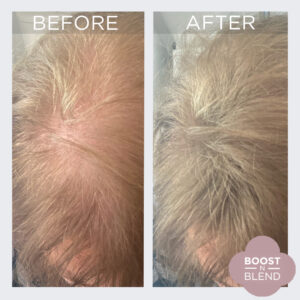Does Weight Loss Cause Hair Loss?
Tips to Avoid Losing Hair as Well as the Weight
Does weight loss cause hair loss? This is a very common question many women ask. Most certainly there is a connection between the two. What can you do about it and can you avoid it?
The most common form of hair loss associate with rapid weight loss or large amounts of weight loss is known as Telogen Effluvium – also known as diffuse hair loss. That is, hair is thinning out all over and not in one particular area.
In order to understand the reason for this hair loss you first need to know about the hair growth cycle.
Our hair goes through three phases: the growth phase (anagen), the resting phase (catagen) and the falling phase (telogen).
Most of our hair is in the growth phase at any one time and for most of us the hair growth phase can last up to two years. Then, at the same time, anywhere from about 5-15% of our hair is transitioning into the resting phase. This resting phase can last from one to six months with the average being around 3-4 months. When the hair starts to grow again, the resting hair will fall out. So in the normal course of events, we will lose up to about 100 hairs a day.
This normal cycle happens without you being aware of it – until something interrupts the flow.
Why Does Weight Loss Cause Hair Loss?
When the body is stressed by surgery, illness, changes in diet, hormones and even emotional stress, your body has to make some alterations for survival. Hair growth is one of the casualties. When the body is in a stressful period, it puts a halt on the hair growth phase. So the short answer to the question does weight loss cause hair loss, is unfortunately yes it certainly can.
Once more hairs than usual are prevented from growing, they enter into the resting phase where they remain for a few months until they fall out. It is for this reason that this type of hair loss often occurs some 3-4 months after the episode that caused it.
There can be a number of reasons that bariatric surgery and rapid weight loss can cause hair loss; it could be the shock on the body of the surgery itself, a lower intake of protein (protein is required for hair growth), nutritional imbalances such as a lack of certain vitamins or possibly just the temporary disruption to your body’s normal physiology.
However, if you have had weight loss surgery you can’t suddenly increase your protein intake thinking it will help with your hair growth, because this can seriously interrupt your weight loss. Equally it is important to make sure you take the vitamin supplements if they have been prescribed, as these do help to minimize the effect of a smaller diet on your body.
This kind of hair loss following extreme weight loss and in particular bariatric surgery causing extreme weight loss is common in both men and women and across all races.
The good news is that it is very likely that it will come back unless you have another underlying cause such as genetics, a hormonal imbalance or another chronic disease.
How to prevent Hair Loss with Weight Loss:
- Try not to worry too much about it, putting your body under more stress
- Ensure you don’t skimp on the protein in your diet
- Take your vitamins as prescribed (or get a blood test to see if you are deficient in any particular vitamin so you can supplement it)
- Specifically check for deficiencies in iron, zinc and B vitamins (note: do not put yourself on these without first checking with your physician because an over-supply of these is also dangerous to your health).
- Consider an instant shake in volumiser such as BOOST N BLEND. This can reduce your stress levels as your hair will instantly look up to ten times thicker and that worry can be gone.








